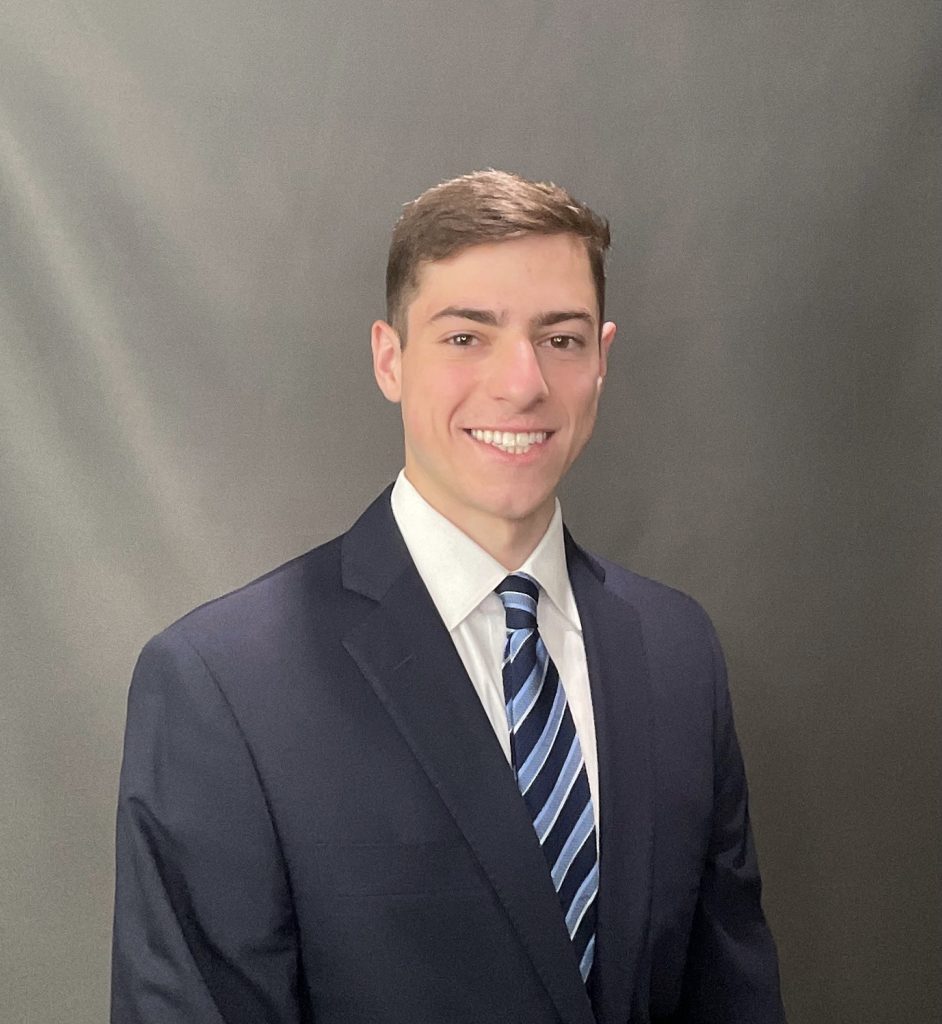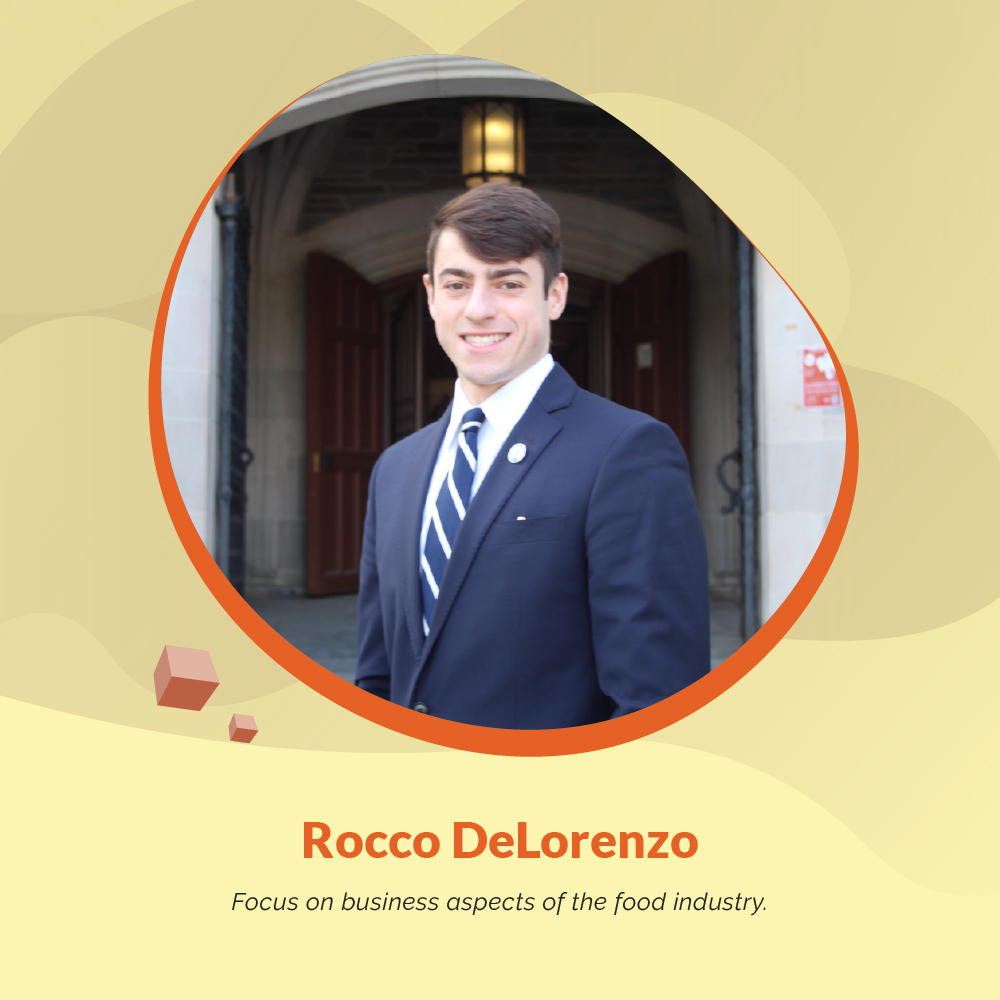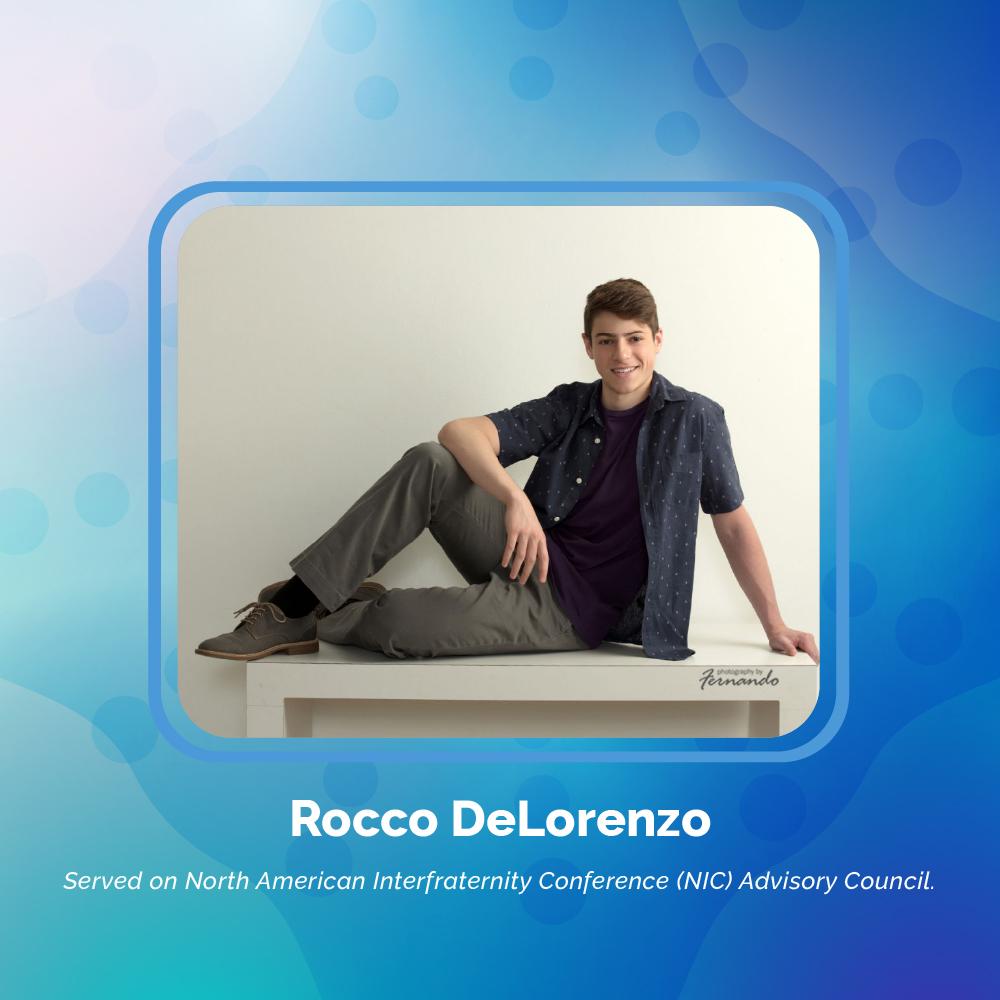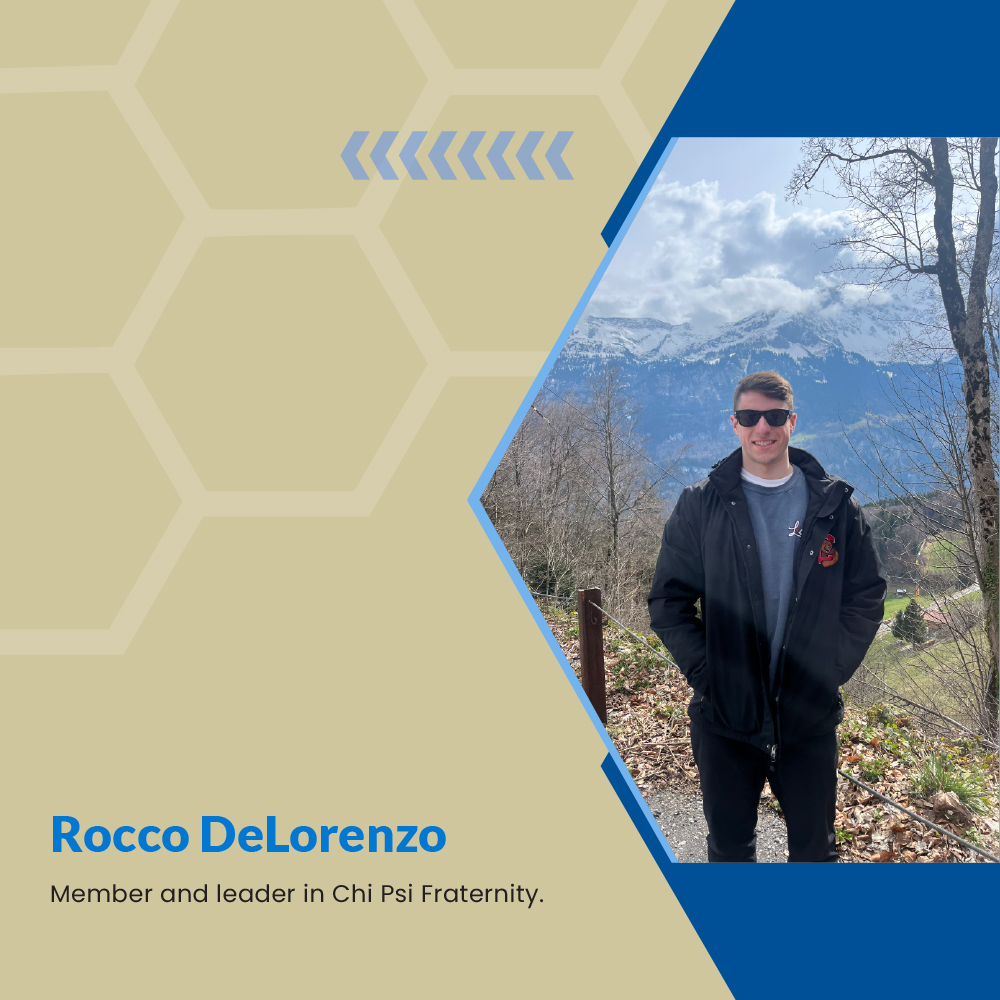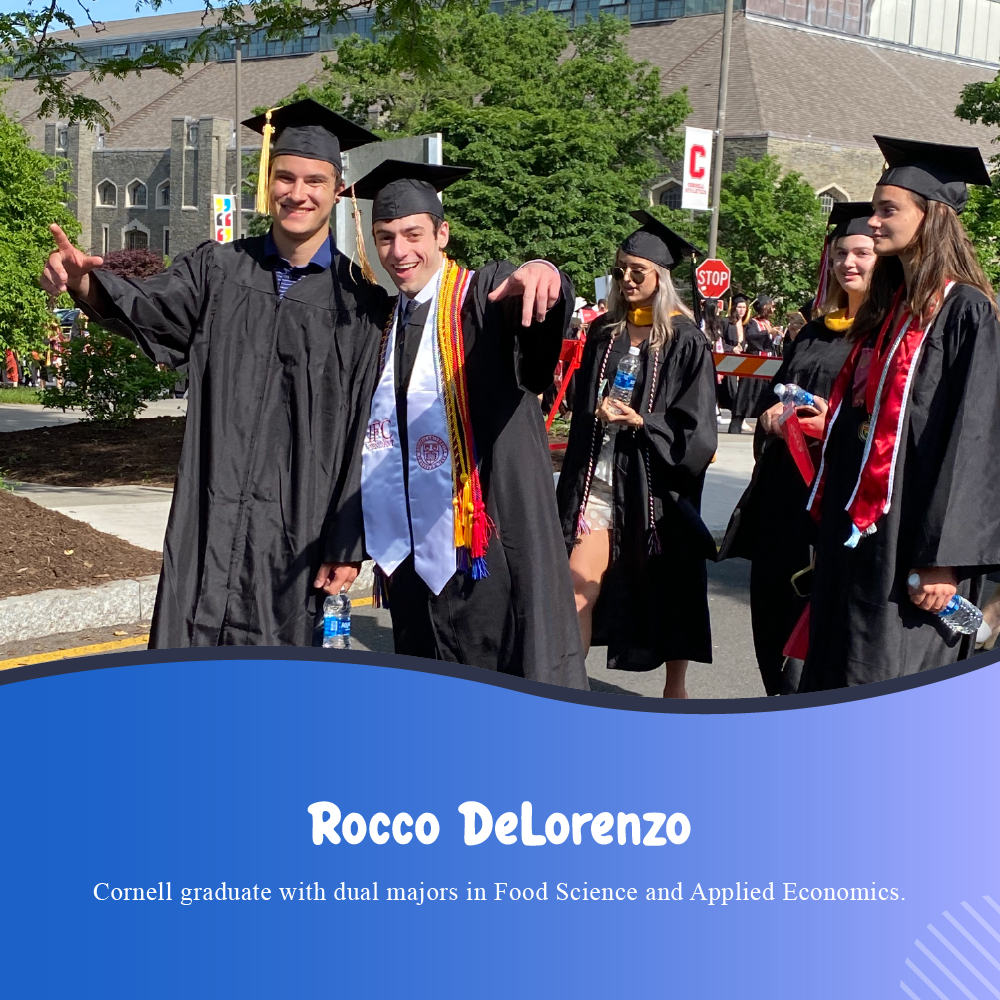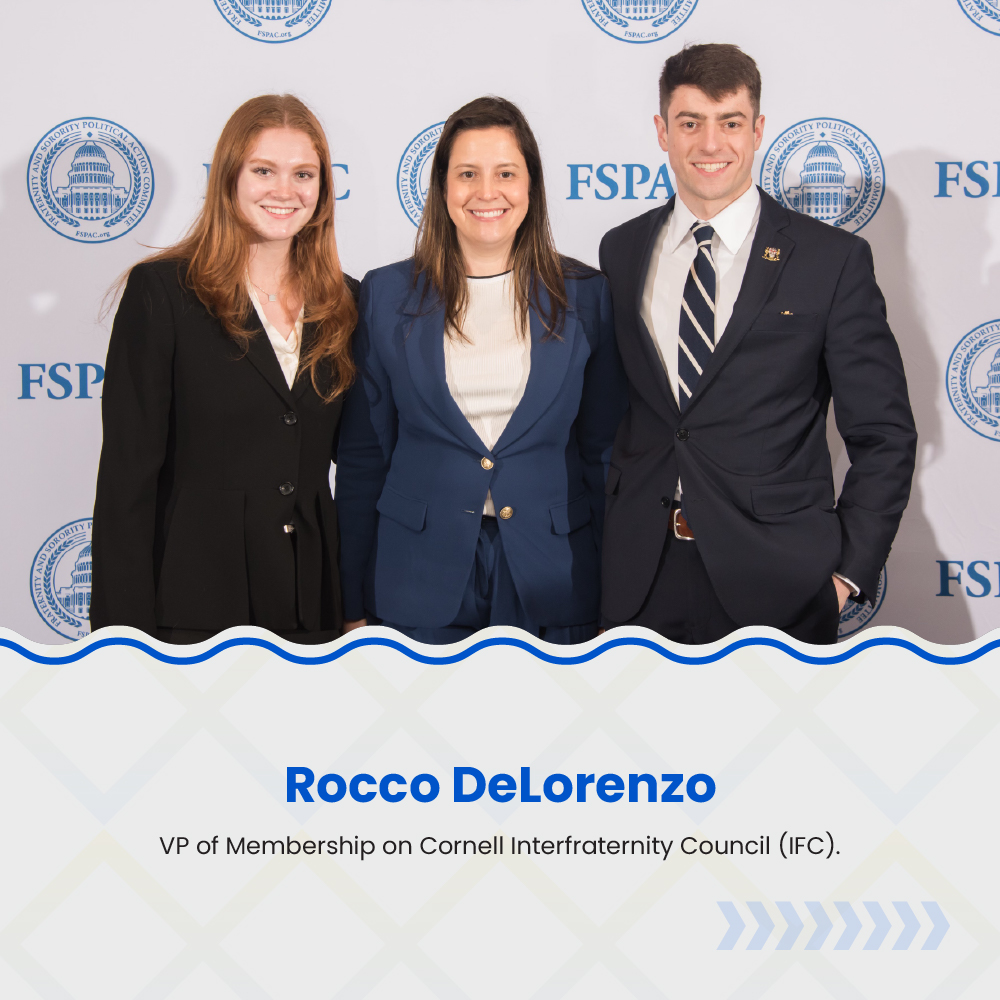About Rocco DeLorenzo
Rocco DeLorenzo is a recent graduate of Cornell University’s College of Agriculture and Life Sciences and Charles H. Dyson School of Applied Economics and Management. During his time as an undergraduate, he successfully completed a dual major: Food Science with a concentration in business and Applied Economics and Management with a concentration in strategy and food industry management.
Rocco’s interests within the food industry lie between a “business first” ideology fit within a specific concentration: the science behind foods and the industry that supports it.
Involved in Student Activities at Cornell University
While at Cornell, Rocco engaged in a variety of student organizations and experiences to enrich his undergraduate experience. However, after participating in the fraternity’s formal recruitment process in the Spring 2021 semester, Rocco became a member of Chi Psi Fraternity at Cornell. Shortly after joining, Rocco knew he found his “home away from home” in Chi Psi, and immediately felt a calling to give back to the organization by embracing leadership roles within it.
Correspondingly, Rocco was elected to the position of Risk Manager and Academic Chair in Chi Psi, where he would serve in both roles throughout his sophomore and junior years. Although small in scope, Rocco felt these leadership experiences were particularly impactful since they provided him with a sense of purpose and laid the foundation for the more prominent leadership roles he would pursue in the Cornell community.
Midway through his sophomore year, Rocco was elected to serve as the VP of Membership and Alumni Development on the Cornell Interfraternity Council (IFC) Executive Board. Since the Cornell IFC is the established governing body of 28 different fraternity organizations at Cornell, amounting to around 1,500 individual members, the expanded scope of the role allowed Rocco to positively impact his community at a wide-reaching scale. Over the next year in his role, Rocco developed a new, more comprehensive Hazing Prevention Training program, which he would present to over 50 designated new member educators from the fraternity chapters in the IFC community. Succeeding this, with the intent of promoting camaraderie between fraternity chapters, Rocco organized and hosted a Spikeball Tournament for the entire IFC community to participate in.
After learning about an accidental drug overdose of an IFC community member while attending a social event, Rocco immediately took action to address the issue by leveraging his platform to enact preventative measures across the community. Within one week of the incident, Rocco identified and established a community partner to provide Narcan Training, including the free distribution of Naloxone, to all Cornell IFC chapters. At the time, since Cornell University did not offer Narcan Training or Naloxone distribution to students, this initiative directly led to a safer IFC community, as well as left a lasting impact on Cornell University, which began offering training and Naloxone distribution in the following year due to the success of the IFC initiative.
In his junior year, Rocco continued making a positive impact while in his VP position on the IFC Executive Board by coordinating and operating the first annual Cornell IFC Charity Flag Football Tournament, resulting in over 200 individuals participating and raising over $2,000 for a local charity in Ithaca. The positive contributions Rocco made to the Cornell IFC community while serving on the IFC executive board were becoming evermore visible, and he remained optimistic regarding the long-term outlook of fraternities at Cornell.
However, in early November 2022, following multiple reports of sexual assault and related misconduct, which were alleged to have originated from two different Cornell IFC fraternity chapters, it became apparent to Rocco that the IFC community had serious issues that needed to be addressed, and that a cultural shift was necessary to make the IFC community safer for all.
Within hours of the report notification, Rocco, along with the rest of the IFC executive board, chose to hold an emergency meeting, resulting in their voluntary decision to place a temporary pause on all IFC community social events for at least the rest of the semester. Additionally, Rocco and the IFC executive board agreed that the pause on social events would only be lifted after a formalized plan of increasing safety measures could be created and implemented across the community.
From that day forward, and until the last day of the semester, Rocco and other IFC executive board oftentimes met multiple times a day as they ceaselessly worked to develop a series of effective initiatives to be included in their Sexual Violence Prevention plan. During the development of the initiatives, Rocco worked collaboratively with various community stakeholders, such as staff members at Cornell Health and the Advocacy Center of Tompkins County, to receive feedback on initiatives, work to refine the specific attributes of the plan, and generate increased support before implementation.
Although his term on the IFC executive board was set to end at the conclusion of the Fall semester, Rocco remained dedicated to continuing the development of the Sexual Violence Prevention plan and was determined to see its implementation in the IFC community. As an outspoken advocate of previous Sexual Violence Prevention efforts and a desire to positively impact the Cornell community with these tangible measures, Rocco decided to re-run for a position on the IFC executive board in the upcoming term. In early December, at the annual IFC Executive Board elections, Rocco was unanimously elected to serve as President of the Cornell IFC for the upcoming year. As the only returning IFC executive board member in the upcoming term and with new responsibilities of representing the IFC community, Rocco took a sense of ownership over the plan and was determined to ensure it was implemented successfully and in a timely manner.
After completing the semester and returning home, Rocco promptly resumed work on refining the series of initiatives included in the Sexual Violence Prevention plan by continuing to meet frequently with community stakeholders.
As the lineup of planned initiatives neared its completion, and despite the hundreds of hours Rocco had dedicated to the plan, he was still concerned about garnering support from the IFC community to fully integrate the initiatives, as well as the border perception from the Cornell community. To mitigate these possibilities, Rocco believed that framing the overall plan would be essential to generating support. After rearranging the list of planned initiatives and noting the methods used within each, the framing became clear to him. Rocco, who was partially inspired by the research findings and theories of Jennifer Hirsch and Shamus Khan discussed in the book Sexual Citizens: a Landmark Study of Sex, Power, and Assault on Campus, decided that the planned interventions of the Sexual Violence Prevention plan logically fit into three distinct pillars: Environmental, Empowerment, and Educational.
Rocco, who returned to campus early in preparation for IFC Spring Formal Recruitment, was also concurrently monitoring the final stages of approval for the Sexual Violence Prevention plan, where he learned of its approval soon after and a planned launch date of February 1st, with social events returning as early as February 3rd. Throughout recruitment week, Rocco continued working to cultivate support for the upcoming changes with IFC community members, as well as meeting individually with nearly all the 28 chapter presidents so he could alleviate their concerns.
When the date of the public announcement arrived and the specific details of the Environmental, Empowerment, and Educational Interventions were provided, Rocco was relieved by the broadly positive reaction from both the IFC community and the wider Cornell community at large. Over the next few weeks, Rocco visited various social events to observe the initiatives in action and was pleased to see chapters continued to adhere to the new changes.
The genuine care and dedication shown by Rocco as he spearheaded the Sexual Violence Prevention plan in the IFC community represents yet another instance of his positive influence in the Cornell community. The tenacity demonstrated by Rocco and the fraternity chapter’s commitment to accountability served as the foundation for enacting a culture shift among fraternities at Cornell. The efforts of Rocco and the rest of the IFC community to create a safer environment did not go unnoticed, and in January 2024, the Cornell University Interfraternity Council was recognized with the National 2023 Outstanding Peer Governance Award from the North American Interfraternity Conference (NIC).
Served as Vice President of Finance of the Student Assembly
Aside from his engagement with the Cornell IFC community, Rocco extended his talents to the Cornell Student Assembly, where he would serve as the VP of Finance throughout his junior and senior years. Following the November 2022 incidents of alleged misconduct in the IFC community, Rocco swiftly organized and sponsored Resolution 12: Supporting Survivors and Facilitating Harm-Reduction Strategies in Greek Life, including convincing all executive board members of the IFC and PHC to co-sponsor the Resolution.
In the remainder of his junior year and throughout the ensuing summer, Rocco closely collaborated with campus administrators across various departments to prepare for the upcoming 2024-2026 Student Activity Fee setting cycle, which Rocco would be responsible for overseeing in the Fall 2023 semester. As a primary duty of the VP Finance role and as the chair of the Appropriations Committee, Rocco is tasked with developing the application process and funding criteria for 29 campus organizations, eventually culminating in the Student Activity Fee dollar amount that each Cornell student would pay in the 2024-2025 and 2025-2026 academic years.
As the Fall 2023 semester approached, Rocco worked conjointly with student leaders of the 29 campus organizations, as well as Cornell administrators, to streamline the application process by shifting to a greater financial focus. When the start of the semester arrived, Rocco and the Appropriations Committee began the process of individually meeting with the 29 campus organizations, occurring over a 9-week period throughout the semester. Following each meeting, Rocco prepared detailed financial summaries of the organization with the justification of the funding decision, which he would go on to present at the next Student Assembly meeting on Thursdays.
In the end, Rocco’s final compiled report of all the organizations totaled a length of 82 pages, nearly triple the length of previous compiled reports. Since the most recent fee was set at $310, and the new fee was recommended to be $424, Rocco firmly believed an overly detailed report was necessary to depict the financial obstacles faced by campus organizations that were caused by the recent inflationary environment over the previous two years. Although Rocco’s recommended $424 fee was unanimously approved by the Student Assembly on November 30th, 2023, the fee still needed to be approved by the leadership of Cornell University.
As a way to quantitatively demonstrate inflation’s financial impact on on-campus organizations, as well as justify the largest single-term increase of the fee in its 66-year history, Rocco took it upon himself to create a “Student Activity Fee Price Index,” similar to the Consumer Price Index, which tracked all the expenses of campus organizations. Following a meeting with Michael Kotlikoff, the current President of Cornell University, Rocco’s recommended fee increase was approved, jumping to $384 in the 2024-2025 academic year and rising again to $424 in the 2025-2026 academic year. When accounting for the number of enrolled students, Rocco’s efforts to improve the student experience and management of the fee-setting process resulted in the approval of over $13.17M for campus organizations, with the $384 and $424 fees amounting to $6.22M and $6.95M respectively.
Additional Engagements On-Campus and within the Local Community
After the success of his work with the Cornell IFC, Rocco was one of six individuals selected to serve as a member of the North American Interfraternity Conference (NIC) Advisory Council. This opportunity allowed Rocco to engage with industry leaders of the national fraternity community while helping to influence and shape the fraternity experience. Here, Rocco leveraged his skills to create national IFC resources, influence upcoming national IFC policies, and mentor other IFC officers at different universities.
Meanwhile, at Cornell, Rocco was selected to be a member of the Food Marketing Fellows honors program, where he had the opportunity to engage with food industry leaders and businesses, both locally near the Ithaca area and internationally within Switzerland.
In addition, Rocco contributed to organizations such as the Dyson Ambassadors, which work conjointly with the Cornell admissions department to provide the student perspective to prospective students, as well as the CALS Alumni Association Board, which relied on his student perspective to develop effective methods of engaging the student population.
Rocco’s academic achievement, influential leadership experiences, and contributions to the broader Cornell community were recognized by his peers. After being selected to become a member of the Order of Omega Honor Society during his junior year, Rocco was also selected to become a member of the Der Hexenkreis Senior Honor Society in his senior year.
Before attending Cornell University in Ithaca, Rocco attended Christian Brothers Academy, a private Catholic college preparatory school in Syracuse, New York. In high school, he participated in varsity sports, including soccer and bowling.
Certifications and Awards
Rocco has received training in the Principles of HACCP, Good Manufacturing Practices, and General HACCP at Cornell University. Additionally, Rocco has been trained as a Preventive Controls Qualified Individual (PCQI) from the Food Safety Preventive Controls Alliance (FSPCA). Finally, Rocco has received his Safe Quality Foods (SQF) certification from the Safe Quality Foods Institute (SQFI).
Rocco has also been recognized through multiple awards, such as 1st Place in the 2023 Northeast Greek Leadership Association Order of Omega Case Competition and recognition of Cornell IFC when they received the 2023 Outstanding Peer Governance Award from the North American Interfraternity Conference (NIC).
Rocco DeLorenzo’s Work Experience
With his studies focused on the intersection of food science principles and the industry that supports it, Rocco also gained on-the-job experience during his summers away from school.
He worked at Giovanni Foods during the summer of 2021 as a Quality Control Intern, where he would perform food quality checks hourly to ensure compliance with operational standards, prepare documents in preparation for the upcoming Safe Quality Food audit, formulate a roasted red pepper pomodoro sauce in R&D for future production.
The following summer, he worked at Mondelēz International in East Hanover, New Jersey, as an OREO Cakester Ingredient Technology intern. Here, Rocco analyzed the functionality of 16 ingredients on sensory aspects of the OREO Cakester, administered two sensory tests on global OREO cake offerings to discern preferred product traits, and engaged through Rainbow Council and Multi-Gen Alliance ERGs.
Last summer, Rocco worked at Restaurant Brands International as an Operations Leadership Development Program Intern with the Burger King North American R&D Operations team. At RBI, Rocco learned all Burger King restaurant operations related to food preparation through over 125 hours of restaurant experience. Additionally, Rocco conducted operational research on productive labor hours required to complete 245 different Burger King restaurant tasks, as well as collaborating cross-functionally with the Profitability team to add research results into their new prime profitability model.
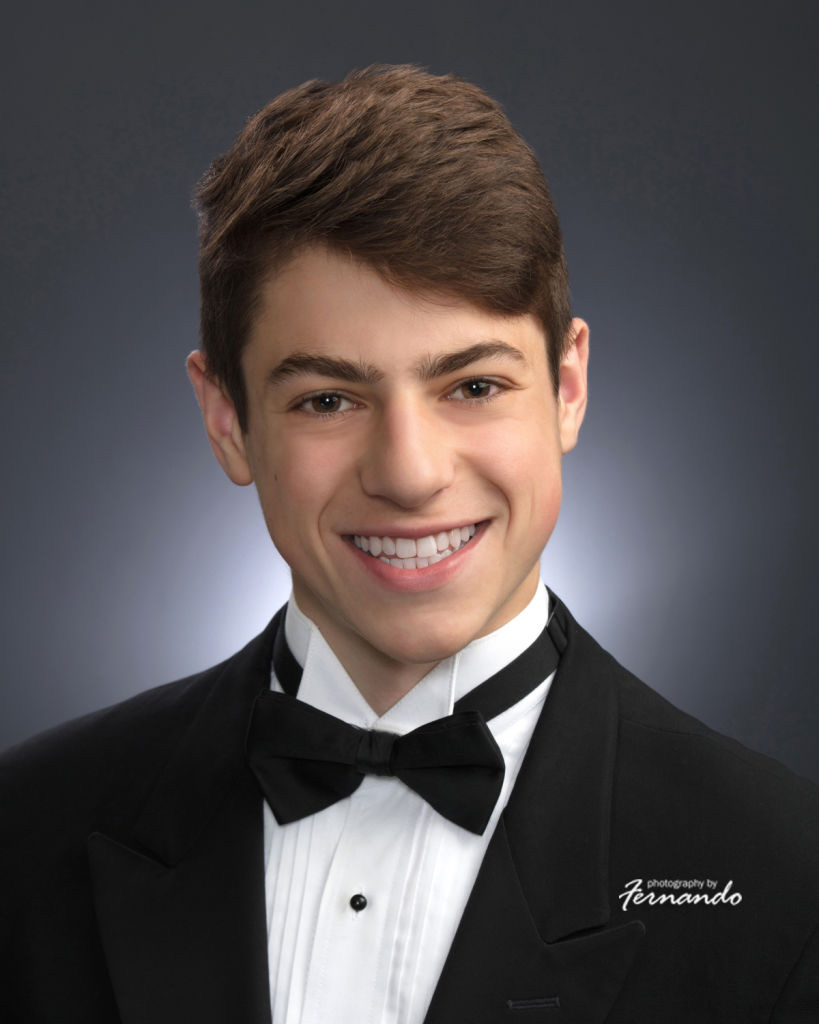
Portfolio
Rocco DeLorenzo
